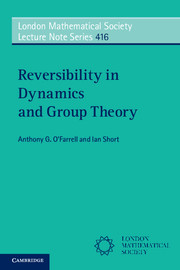Book contents
- Frontmatter
- Contents
- Preface
- 1 Origins
- 2 Basic ideas
- 3 Finite groups
- 4 The classical groups
- 5 Compact groups
- 6 Isometry groups
- 7 Groups of integer matrices
- 8 Real homeomorphisms
- 9 Circle homeomorphisms
- 10 Formal power series
- 11 Real diffeomorphisms
- 12 Biholomorphic germs
- References
- List of frequently used symbols
- Index of names
- Subject index
3 - Finite groups
Published online by Cambridge University Press: 05 June 2015
- Frontmatter
- Contents
- Preface
- 1 Origins
- 2 Basic ideas
- 3 Finite groups
- 4 The classical groups
- 5 Compact groups
- 6 Isometry groups
- 7 Groups of integer matrices
- 8 Real homeomorphisms
- 9 Circle homeomorphisms
- 10 Formal power series
- 11 Real diffeomorphisms
- 12 Biholomorphic germs
- References
- List of frequently used symbols
- Index of names
- Subject index
Summary
In this chapter, we denote the cardinality of a set F by |F|. Thus the order of a group G is denoted |G|. We recall that R(G), or just R, denotes the set of reversible elements of G, and Rg(G), or just Rg, denotes the set of elements h that satisfy hgh−1 = g−1. Also I(G), or I, denotes the set of involutions in G, and In = {τ1 … τn : τi ∈ I}.
Reversers of finite order
Proposition 3.1Suppose that elements g and h of a group G satisfy hgh−1 = g−1. If h has finite order, then either g is an involution or else the order of h is even. In the latter case, g is also be reversed by an element whose order is a power of 2.
Proof To prove the first assertion, suppose that the order of h is odd. Since each odd power of h reverses g, it follows that the identity 1 reverses g. Therefore g = g−1, so g is an involution.
Suppose now that h has even order 2kq for positive integers k and q, where q is odd. Then hq also reverses g, and this element has order 2k. This proves the second assertion.
Corollary 3.2A finite group G contains a nontrivial reversible element if and only if G has even order. In fact, if G contains a nontrivial reversible element, then it contains a nontrivial involution.
Proof Suppose first that G has a nontrivial element g that is reversed by another element h. By Proposition 3.1, one of g or h has even order, so G also has even order.
Suppose now that G has even order. By partitioning G into subsets {g, g−1} we see that G contains a nontrivial involution. Since involutions are reversible, all parts of the corollary have been accounted for.
- Type
- Chapter
- Information
- Reversibility in Dynamics and Group Theory , pp. 39 - 58Publisher: Cambridge University PressPrint publication year: 2015

